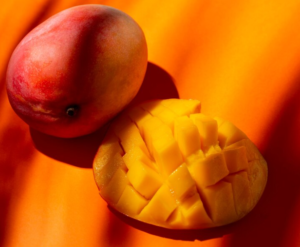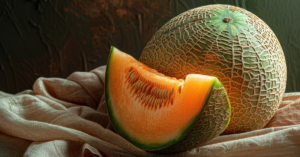Whenever someone mentions mango, the first thing that comes to mind is the image of a golden-yellow colored fruit with a light red shade on it, which directly points towards “Alphonso Mango”. Although mango is called the “king of fruits”, Alphonso is called the “king of mangoes”. Globally, Alphonso has a deep place in the hearts of mango-lovers. But do you know what is it that makes this fruit so special? Let’s know from this article, in which we have explained its history, characteristics, nutrients and many other information to provide in-depth information about Alphonso.
Table of Contents
The Origin and History of Alphonso
Mangoes have ancient roots in India, but the Alphonso came to India sometime in the 16th century when Afonso de Albuquerque, a Portuguese general and military strategist introduced grafting techniques to the western coast of India, mostly Maharashtra & Gujarat. This technique led to the development of several mango varieties. Out of these, Alphonso is a very attractive and tasty mango, and it is named after that Portuguese general.
As soon as Alphonso comes in the market, people feel that summer season is approaching. And they are very happy that now they will get to eat delicious Alphonso. Alphonso has been always associated with luxury and celebration for centuries.
What Makes Alphonso Special?
Although there are around 1500 varieties of mangoes found in India, the Alphonso mango is unique for several reasons:
1. Unparalleled Flavor
The aroma of this fruit is very distinctive. The aroma of this fruit, which is often combined with the sour smell of flowers, makes this fruit unique. Alphonso is known for its soft-creamy, juicy and perfect balance of sweet-sour taste.
2. Visual Appeal
The fruit’s attractiveness is due to its golden-yellow colour and a slight red blush. Inside, the fruit is saffron-coloured and has a very smooth skin.
3. Seasonality
The very short harvesting time of this fruit makes it extremely unique and appealing. In the summer season, it is available only from March to June.
Cultivation and the GI Tag
Alphonso mango cultivation requires a special type of soil and climate. Ratnagiri, Sindhudurg, Devgad & Raigad districts of Maharashtra are famous for growing the finest Alphonso.
The World Intellectual Property Organization (WIPO) awarded the region the Geographical Indication (GI) tag in 2018, which ensures that only mangoes grown in this region are true Alphonso. This tag not only enhances the reputation of the fruit but also protects the livelihood of the farmers who have nurtured these mangoes for generations.
Culinary Versatility of Alphonso
Alphonso mangoes are delicious to eat directly, but they are also used in many ways in desserts and beverages in India. Popular recipes include:
- Aamras: A creamy mango pulp served with puris or as a standalone dessert.
- Mango Lassi: A refreshing yogurt-based drink infused with the sweetness of Alphonso.
- Mango Shrikhand: A rich, sweetened yogurt dish flavored with Alphonso pulp.
Also, Alphonso can be used in a variety of ways, including cakes, sorbet, salads and many more. It is a favorite and delicious item in kitchens around the world.

Economic Importance and Global Demand
Alphonso is famous not just in India but all over the world. India exports it to American, European and Gulf countries. Due to the quality and limited time of cultivation of these Alphonso, farmers get very good prices for it.
However, due to global climate change, farmers have to face many problems like unseasonal rains, pests, etc. Despite all these problems, people like Alphonso so much that its demand never decreases.
A Cultural Icon
In India, Alphonso is not just a mango, but it is also associated with many traditions and sentiments. Farmers celebrate the first harvest of the crop, families invite each other or gift Alphonso mangoes to relatives when the first aamras of the season are made. In fact, many people even dedicate their first mango to God. Thus, everyone has many memories associated with Alphonso, especially childhood memories.
Challenges and the Way Forward
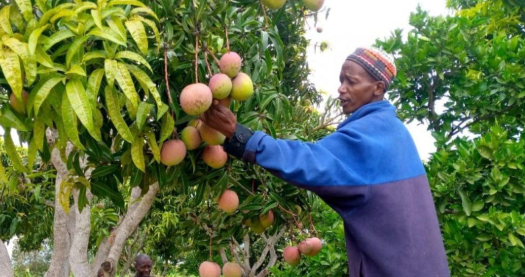
Alphonso mango farming faces many challenges. Global climate change is a major reason. Unseasonal rains and lack of proper temperature in summer cause great damage to the crop. Apart from this, fake Alphonso brought by black marketers is also a major reason.
The government is making continuous efforts to deal with all these challenges of farmers. The government also provides information about new technology and sustainable farming to farmers. Nowadays, through the Internet, information about the identification of real Alphonso mangoes is also given to the public.
How to Identify Genuine Alphonso Mangoes
Due to the increasing demand and price of Alphonso mangoes, some similar looking Alphonso mangoes are being sold in the market as Alphonso. The following points should be kept in mind while buying genuine Alphonso mangoes:
1. Check the Source
When buying Alphonso mangoes, it is important to check the label. Authentic Alphonso mangoes come from GI-tagged certified areas such as Ratnagiri, Raigad or Devgad.
2. Examine the Shape and Color
The color of Alphonso mango is golden-yellow and on top, a slight red shade. Its shape is oval.
3. Feel the Texture
They should feel firm yet slightly soft when ripe.
4. Smell the Aroma
Authentic Alphonso mangoes have a distinct sweet and floral fragrance.
5. Avoid Artificial Ripening
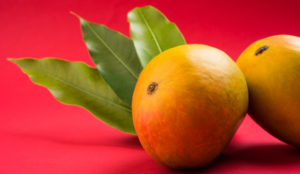
Genuine Alphonso mangoes ripen naturally. If someone uses artificial ripening, the colour will be different and the surface will also become very smooth. Such duplicate mangoes should be avoided as they are also harmful for health.
Conclusion
Alphonso mangoes are not just a fruit; they are an experience—a symbol of India’s agricultural excellence, cultural richness, and culinary heritage. While you can eat them any way you like, as a dessert, a sorbet or as a fresh fruit, the taste of Alphonso mangoes not only lingers in your mouth for a long time, but also makes you wait for the next season.
So whenever summer arrives, don’t forget to eat this golden fruit. Every bite will give you such a burst of flavour in your mouth that you will never finish the appetizer. Alphonso mangoes are a unique bond of tradition and emotions.
FAQ’s about Alphonso Mangoes
Alphonso mangoes are referred to as the “king of mangoes” Because its captivating aroma and its very special sweetness are unique.
Alphonso mangoes are primarily grown in India, particularly in the Ratnagiri, Devgad, Sindhudurg, and Raigad districts of Maharashtra, as well as some parts of Gujarat and Karnataka. The climate and soil in these regions is absolutely compatible for this fruit.
Alphonso mangoes are unique because of their rich, buttery texture, non-fibrous pulp, and distinct captivating aroma. Their bright golden-yellow skin with a red shade adds to their appeal.
The Alphonso mango season typically lasts from March to June, with the peak harvest period occurring in April and May. Their short availability window makes them even more appealing.
Authentic Alphonso mangoes can be identified by their:
- Oval shape and golden-yellow color with a slight red shade on top.
- Sweet and fruity aroma.
- Firm yet slightly soft texture when ripe.
Additionally, buying from trusted sellers or looking for GI-certified labels can ensure authenticity.
Yes, Alphonso mangoes are exported to many countries, including the USA, UK, UAE, and Japan. However, they may be available in limited quantities and at higher prices due to their exceptional quality.
To store Alphonso mangoes:
- Keep unripe mangoes at room temperature until they ripen.
- Once ripe, store them in the refrigerator to extend their shelf life for up to a week.
Avoid storing mangoes at one place to prevent spoil.
Alphonso mangoes are adjustable and used in various dishes such as:
- Aamras (sweet mango pulp).
- Mango Lassi (a yogurt-based drink).
- Mango Shrikhand (flavored yogurt).
- Desserts like Alphonso mango cheesecake, mango mousse, and mango sorbet.
They are also enjoyed fresh or in salads.
Alphonso mangoes are rich in vitamins A & C and antioxidants. Eating them improves immunity, skin cells, and is also beneficial for digestion. But if someone has diabetes, then he should consume them in regular quantities as they are high in natural sugar.
The World Intellectual Property Organization (WIPO) can only provide the Geographical Indication (GI) tag that ensures Alphonso mangoes are grown in specific regions of India, such as Ratnagiri, Devgad, and Sindhudurg. This protects their authenticity and helps farmers by ensuring fair market practices.
Alphonso mangoes are expensive due to their limited availability, high demand, and labor-intensive cultivation process. Additionally, their export to international markets is also a major reason for its higher price.
While Alphonso mango trees can be grown in tropical climates outside India, the unique taste and aroma of the fruit are influenced by the specific soil and climatic conditions of the Alphonso-growing regions in India.
Yes, counterfeit Alphonso mangoes are sometimes sold in markets. Buyers should look for specific characteristics of Alphonso mangoes or purchase from trusted sellers to avoid counterfeit.
To maintain quality during international shipping, Alphonso mangoes are usually harvested slightly unripe and packed in temperature-controlled conditions. They ripen naturally en route to their destinations.

10 Proven Benefits of Bananas for Health and Well-being
Bananas are known for their natural sweetness, ease of peeling and rich nutrition. This makes them one of the most commonly consumed fruits in the world. Though bananas originated in Southeast Asia, they are now

Disease X: The Next Pandemic?
Emerging infectious diseases pose one of the greatest threats to human health and global stability. One of them, “Disease X” has intrigued scientists and WHO, as it represents the potential for an unknown disease to
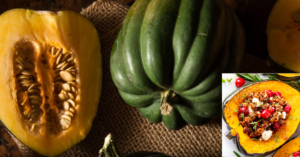
The Remarkable Benefits of Eating Acorn Squash in Winter
Acorn squash has all the qualities that make it special. Winter calls for warmth, comfort, and nutrition, and acorn squash provides all of these. This vegetable is not just delicious but also has a lot

Omega-3 Fatty Acids
Omega-3 fatty acids play a very important role in the nutrients needed to maintain overall health. As people are getting to know about it, its popularity is increasing day-by-day. These fats play a very important
